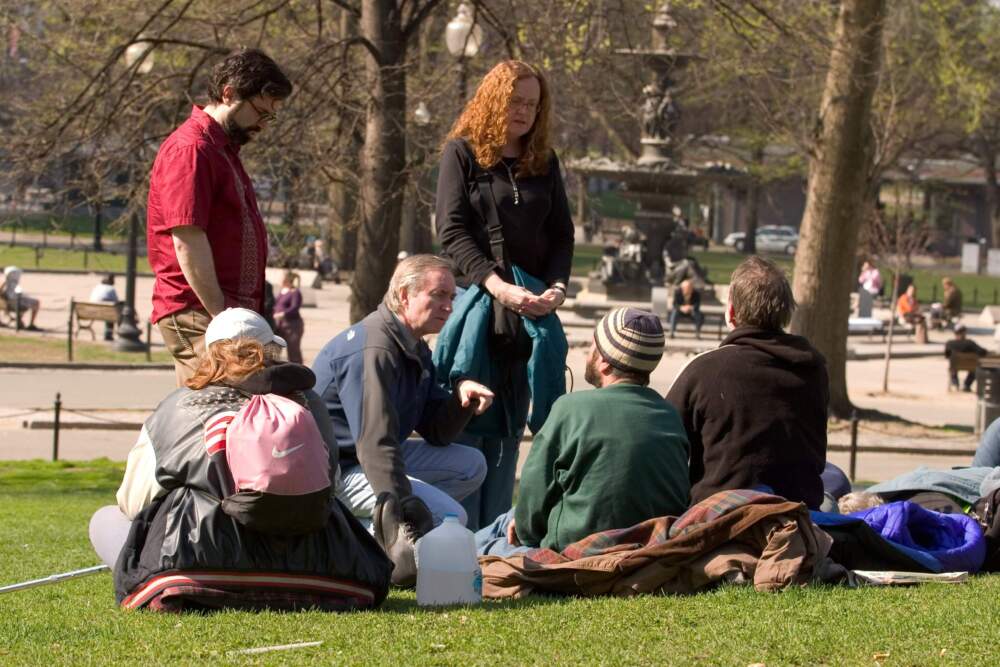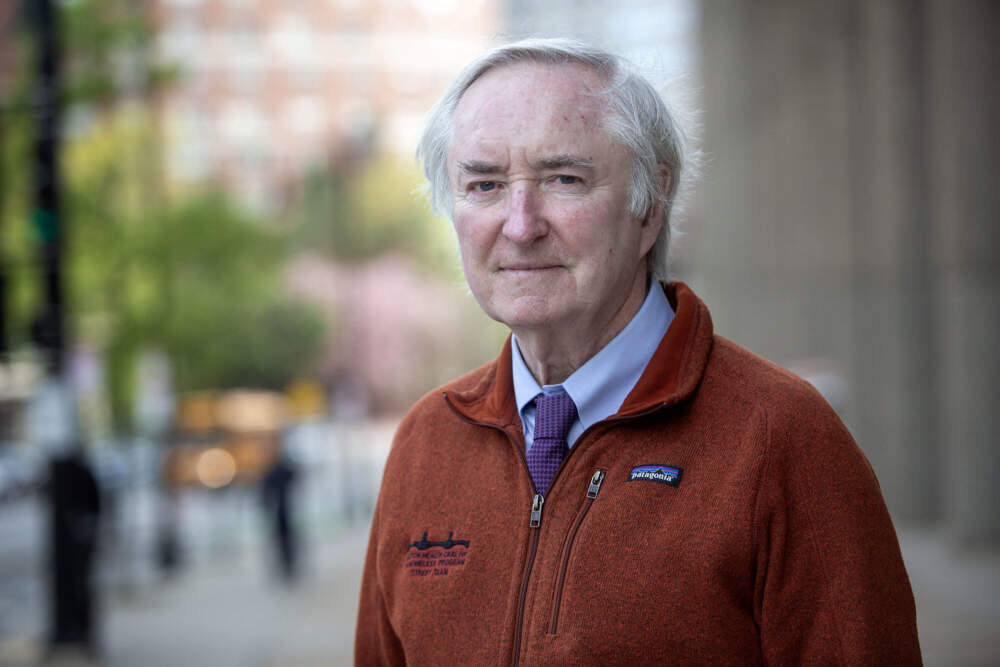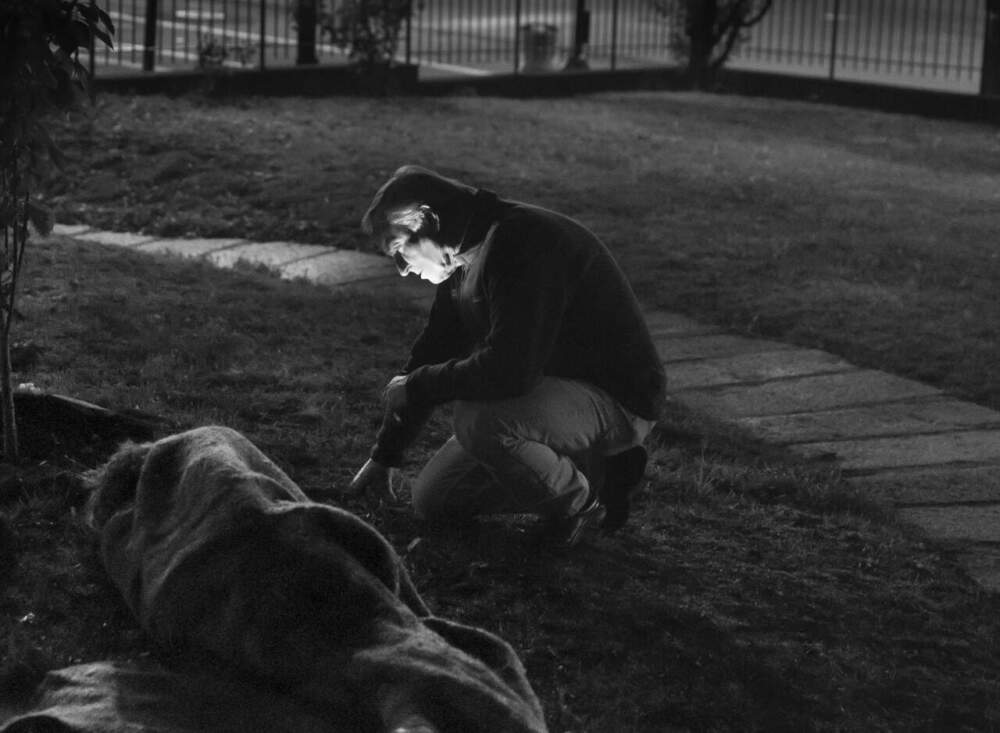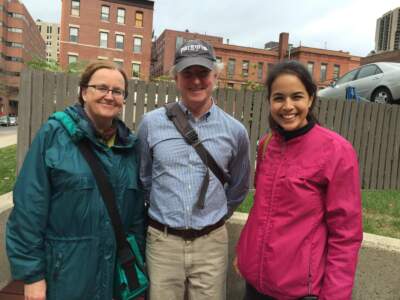Advertisement
Commentary
On the streets, providing care starts with paying close attention

Editor’s note: Dr. Jim O’Connell, the president of the Boston Health Care for the Homeless Program (BHCHP), has been working with the organization for nearly 40 years, since its start as a pilot program in 1985. The Program now has some 600 medical and behavioral health staff, social service providers and support staff, and provides care to 10,000 to 11,000 homeless individuals in Boston every year.
BHCHP operates more than 30 clinic sites in shelters and hospitals, in addition to providing care on the street and in its respite program. This year, Mass General Hospital constructed a permanent clinic space for the organization’s homeless clinic. It is the only academic medical center in the country to have an onsite clinic dedicated to the care of unsheltered rough sleepers.
O’Connell’s work is relatively well known, thanks, in part, to two books: “Stories from the Shadows: Reflections from a Street Doctor,” by O’Connell himself, and “Rough Sleepers” the 2023 best-seller by Tracy Kidder. Cog talked with O’Connell about aspects of his work and life we haven’t necessarily heard before. Over two conversations, we asked him about the relationship between listening and providing care, the ubiquity of death in his work, loneliness and how he’s starting to think about his own legacy.
This piece has been excerpted from those conversations, and edited for length and clarity. — Cloe Axelson
“Earning their confidence and trust is bedrock”
We spend an awful lot of time getting to know our patients because we learned — mostly from nurses many years ago — that earning the confidence and trust of folks who have been scarred by being out on the streets, or in the shelters for a long time is bedrock for doing any kind of health care.
Much of our time is spent trying to manage the things that all doctors, nurses, nurse practitioners and physician assistants take care of: diabetes, hypertension, heart disease, lung disease. Homeless people have a huge burden of those illnesses. And cancer is still pretty close to our leading cause of death outside of drug overdoses. The diagnosis of those illnesses, the management of them and then, taking care of them when they become acute, is really the stuff of our lives.

“They were sick of fragmentation and loss in their lives”
The homeless people who gave Mayor Ray Flynn input when BHCHP was first put together said the most important thing was continuity of care. They were sick of fragmentation and loss in their lives, and they didn’t want a fragmented healthcare system.
We had to work in teams because teams provide better continuity. And those teams were essentially an early version — a 1984 version — of what we now call medical homes.
The brilliance of the homeless people demanding we work in teams has really turned out to be the best hedge against burning ourselves out. When somebody dies, we all feel the pain, and when there's some joy of somebody getting into a house, we all feel the joy. We pretty much depend on one another to sort of carry ourselves through the tough times.
Advertisement
“I don’t want to forget this”
I was a bartender off and on for many years, that’s how I earned my money. When you’re stuck behind a bar for an 8-hour shift, people sit and talk. And if you didn’t enjoy that — or find some way to make it fascinating — it was a really long shift. So, I think I got trained by all the wonderful people at the bar on how to listen to their stories, and I found I enjoyed that — that’s what made the days and nights go by really fast.
When I first got to the shelters, the nurses made me slow down. I was tasked with doing nothing but soaking people’s feet for two months. I couldn't do anything, but really be present and listen. I realized I was beginning to get intrigued and close to these people. They were sharing with me things that I wasn't used to people sharing.
They were sharing with me things that I wasn't used to people sharing. And I wanted to cherish that. I didn't want to ever in any way violate it.
And I wanted to cherish that. I didn't want to ever in any way violate it. I didn’t want to forget what they were telling me, because I wanted to ask them about it the next time I saw them. It was part of entering their lives — or maybe more precisely — the privilege of these people inviting us into their lives.
As I was getting to know people, I started to write down their stories. I realized what incredibly courageous lives they were living — despite these awful odds. I thought they were stories that would inspire all of us, and I wanted to be able to tell them better.
“You have to try to be present in their lives in a really supportive way”
As we get to know people, one of the challenges is navigating the traditional boundary between doctor and patient. We have to walk a very fine and delicate line as we step into people's lives — and become really important in their lives — as they become important in ours.

I would share whatever people needed to know about me, and so did most of my colleagues. And we got to know people normally, like you would as a bartender. It wasn’t: I'm a doctor and you're a patient and let me stay over here. That never worked.
[Growing up in Newport, Rhode Island] we had a family doctor that I knew well. He lived down the street. He had delivered my mother, took care of most of everybody I knew. And when we were sick, he came to our house. And when we went out to dinner, he was frequently there.
When we went to the beach, he was around. So he was part of the community and part of our lives. He just happened to be the doctor.
And I think that old-time family doctor taught us something about how you may have to take care of people who’ve been excluded from so much. You have to try to be present in their lives in a really supportive way.
“Death is ever-present”
Death is ever present, it’s ubiquitous in our work. Homeless people die at shockingly high premature mortality rates: Anyone in a shelter in Boston is four times more likely to die than someone the same age. If you live on the streets, it goes up to 12 times that.
But when people die, we try to do our best to make sure we honor their memory. It's very important to their friends to know that when they die, there will be someone memorializing them.

When we get involved in end-of-life care like that, you realize — with some mixture of joy and horror — that you truly are their family. These people have lost contact with everyone that’s important to them. We were the people they had shared the most with in their final years.
“The loneliness is really what haunts them”
Loneliness is universal among the people we take care of.
They’ve been untethered from all the things that we consider important. They are not part of an American dream, and they are pretty much alone. The people living on the street are the ones I've gotten to know best clinically, and they are a community of their own because all they have are each other. They will fight like brothers and sisters — and the next day they're best friends. It's a real community, which I see as a response to that utter feeling of being alone.

It plays out most vividly for us when somebody who's been on the streets for years finally gets into an apartment, which is truly like a miracle. They realize that after living a hectic life on the street where they had all these survival skills, that all those skills become useless when they go into their studio apartment — that the house is a long way from being a home yet. The loneliness is really what haunts them.
We really have to think through what it means to get somebody who's homeless homed, as opposed to housed.
“I was entirely redundant in our program”
We really believe in continuity. If I'm going to see someone now, I want to be able to say, “Look, I'm going to be around.” But I just turned 76, and I'm not going to be around for that much longer. Yet we have these young, really amazing doctors who are half my age, who will be around for the next 15 to 20 years if we do things right. And that's who should be taking care of them.
I had to stay back for the first time in my life during the first several months of COVID [because of medication that made me severely immunocompromised]. And it killed me, because when there's a crisis like that, you go for it. To sit back was really hard.
But our program just flourished. Our staff set up these amazing tents. They did all the screening, we converted our respite program into a COVID unit. They did all the work.
No one missed a beat, and I realized that I was entirely redundant in our program. My friend said, “Well, that's what you're trying to do — you're trying to make it so you can walk away and the program goes on without you.” There was that awful realization that I was vulnerable, but a beautiful realization that I was no longer needed.
This segment aired on May 29, 2024. The audio version of this piece was produced by Cloe Axelson with help from Tania Ralli. It was mixed by Paul Calo.
This segment aired on May 29, 2024.
